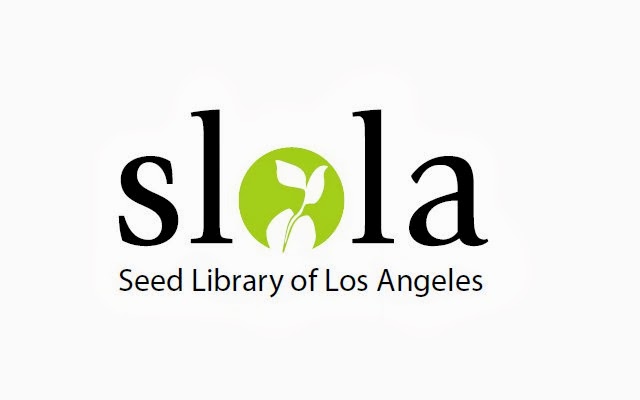When we started the Seed Library of Los Angeles in 2009 we had no concern that a seed library could be illegal, but as events unfolded, guess what? It was!
Unlike Pennsylvania and Delaware where authorities went out to the locations of these seed libraries and gave them a warning, California's Department of Agriculture and Forestry issued a statement that they wouldn't prosecute anyone for trading seeds with people up to several miles away - at that point they thought they were doing us a big favor because the actual law was not specific, merely saying "neighbors" could trade seeds. They had taken "neighbors" to mean actual neighbors, and so, allowing seed sharing clear across town was mighty big of them. Even without a seed law change, it was my impression that catching seed librarians and throwing them into jail was not going to become an urgent issue anytime soon, we wanted to show that sharing seeds, creating libraries of locally grown seeds was an issue that deserved attention. Not arrests.
A sponsor was found through work by Richmond Grows Seed Library and The California Grange (as it was known at that time - now The California Guild) located a lawyer activist who wrote an actual law seed librarians would be pleased with That proposal was introduced to the state legislature sometime near March. It went through several committees successfully and finally was primed to go for the final vote which, if it won, would allow Governor Brown to sign it.
 |
| It was a rainy day in Sacramento when we went up to lobby for the new seed bill that finally did become the law of the state - and no seed savers went to jail either! |
In Southern California, these events were followed closely - we were kept informed and in touch through emails and phone calls with Diana Rudè, lobbyist for the California Guild (formerly the California Grange). Diana was our woman on the scene and of all the people that did work on this bill, I think we owe the most to her. She emailed me in early June with the final draft that would be voted on shortly and sent to the Governor for his signature There was no real organization opposed to the bill, it was sailing through, but when I read the "final" version, I was troubled.
"Troubled" I say, because the language had tweaked us into another corner that was worse than the neighbor clause.The new proposed law read "Seed libraries can expect nothing of value in return for the seeds they dispense." Seeing as I see seeds as valuable, that would destroy the whole concept of a "library" - we wanted the seeds of our seeds back!
I rewrote that sentence in the proposed law:
"Seed libraries can expect nothing of value in return for the seeds they dispense, except for the progeny of the seeds they dispense."
And that's the way it reads today!
My point is, that seed libraries too often are considered only as places where you get seeds, in truth, and what we fought for, was the right to get the next generation of seeds back from our members. In the beginning, this is the work that took up most of our intention. We chose to do our own lending, feeling we would get more seed returns if we gave seeds out ourselves, rather than relying on a local library to do that - we felt if we were the ones giving out the seeds, people could ask us how best to grow the seeds and how best to save them - we thought that would give us a much higher seed return percentage. Now, after almost ten years of hard labor, we are proud to announce that our model of seed library doesn't work much better than the other model of seed library. However, we can report we've made more friends.
But we remain invested in getting the progeny of our seeds back. That is the only way we can build resilience into our seed libraries - the volunteers who keep this thing going can't grow out enough seeds - we need many different members to grow seeds and return seeds to the library.
It may well be that all we want to do is save the seeds, but that turns out to be a "big whole" built on many smaller blocks. You can be one of those blocks - it's fun and not at all scary. Just ask at your next seed library meeting, how do I return seeds to the seed library? We'll be honored to show you and together we can exercise that part of our new seed law.
david

